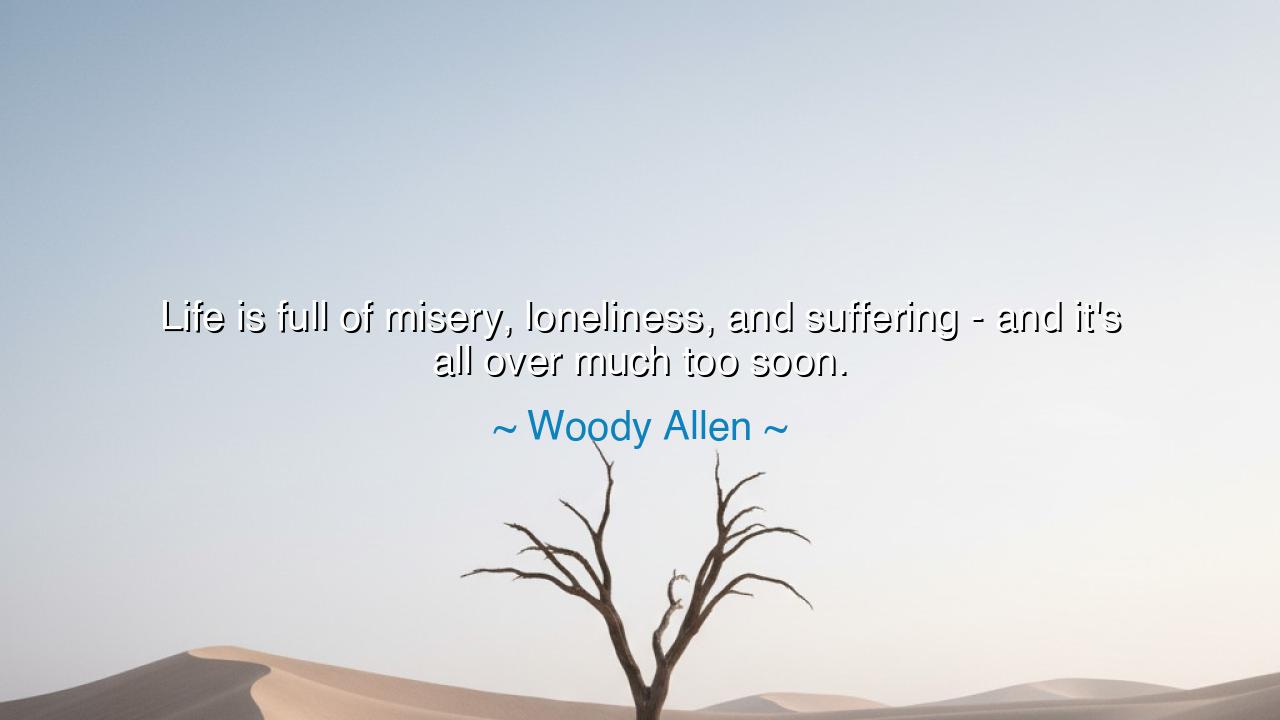
Life is full of misery, loneliness, and suffering - and it's all






Hear, O seekers of truth and meaning, the dark yet strangely luminous words of Woody Allen: “Life is full of misery, loneliness, and suffering—and it’s all over much too soon.” At first, these words may strike the heart like a jest laced with despair, yet in them lies an ancient recognition of the human condition. For life, though marked by sorrow, passes quickly, and the brevity of existence itself makes each moment both tragic and precious. The irony of the statement is its wisdom: that even suffering itself is fleeting, and so too are the joys that accompany it.
The origin of this thought lies in Allen’s own way of weaving humor with philosophy. Known for his wit and his ability to cloak deep existential truths in comedy, Allen captures in this line the paradox of life: we struggle, we ache, we feel loneliness, and yet, before we can fully comprehend its weight, life vanishes like mist at dawn. His words echo the tone of the philosophers of old—those who gazed upon human frailty and dared to laugh, not to dismiss the pain, but to survive it.
The ancients themselves spoke similarly. The Book of Ecclesiastes declares, “Vanity of vanities, all is vanity.” The writer laments toil, suffering, and fleeting joys, yet acknowledges that all must be embraced, for life is but a vapor. The Stoic Seneca, reflecting on death, wrote that life is long enough for great deeds, yet most squander it in distractions, leaving only regret. And the Buddha himself proclaimed that life is suffering, but through wisdom, one may transcend its bonds. Allen’s words are a modern echo of this timeless lament, framed in humor rather than solemnity.
History also gives us a mirror of this paradox. Consider the life of Anne Frank, who in the midst of hiding during the horrors of war, endured fear, misery, and loneliness. Yet in her writings, we find not despair alone, but flashes of joy, laughter, and hope. Though her life was tragically short, she grasped the truth Allen implies: that life, for all its suffering, is precious because it is fleeting. She wrote, “In spite of everything, I still believe that people are truly good at heart.” Her words teach us that even when misery surrounds us, life’s brevity calls us to cling to moments of light.
The meaning of Allen’s quote is not simply cynicism but a reminder: do not be surprised by suffering, and do not waste time. Misery, loneliness, and pain are part of the fabric of human existence, but they are not eternal. What makes life tragic is also what makes it sacred—its swiftness. The brevity of life demands that we do not wait for perfect happiness but find meaning even amid brokenness.
The lesson for us, O listeners, is sobering yet empowering: embrace the fleeting nature of life. Do not run from suffering, for it is inevitable; but neither should you surrender to despair, for suffering is not the whole. Recognize that your days are few, and let that knowledge sharpen your gratitude for every joy, however small. In the shadow of mortality, even laughter and love shine brighter.
Practical actions stand before you: Treasure relationships before they fade. Speak kindness today, for tomorrow may not come. Find humor, even in hardship, for laughter is a shield against despair. Accept suffering as part of the journey, but resist letting it define you. Each moment wasted on bitterness is a moment stolen from the short gift of life.
Thus, remember the paradox spoken by Woody Allen: “Life is full of misery, loneliness, and suffering—and it’s all over much too soon.” Let it remind you not only of the pain of existence, but of its brevity and fragility. Live, therefore, with urgency, with gratitude, and with courage. For though suffering is certain, so too is the opportunity to love, to laugh, and to leave behind a legacy brighter than the darkness through which we pass.






AAdministratorAdministrator
Welcome, honored guests. Please leave a comment, we will respond soon